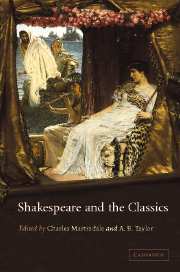Book contents
- Frontmatter
- Contents
- Notes on contributors
- List of abbreviations
- Introduction
- PART I AN INITIAL PERSPECTIVE
- PART II ‘SMALL LATINE’
- PART III ‘LESSE GREEK’
- 10 ‘Character’ in Plutarch and Shakespeare: Brutus, Julius Caesar, and Mark Antony
- 11 Plutarch, Shakespeare, and the alpha males
- 12 Action at a Distance: Shakespeare and the Greeks
- 13 Shakespeare and Greek romance: ‘Like an old tale still’
- 14 Shakespeare and Greek tragedy: strange relationship
- PART IV THE RECEPTION OF SHAKESPEARE'S CLASSICISM
- Select bibliography (compiled by Joanna Paul)
- Index
13 - Shakespeare and Greek romance: ‘Like an old tale still’
Published online by Cambridge University Press: 22 September 2009
- Frontmatter
- Contents
- Notes on contributors
- List of abbreviations
- Introduction
- PART I AN INITIAL PERSPECTIVE
- PART II ‘SMALL LATINE’
- PART III ‘LESSE GREEK’
- 10 ‘Character’ in Plutarch and Shakespeare: Brutus, Julius Caesar, and Mark Antony
- 11 Plutarch, Shakespeare, and the alpha males
- 12 Action at a Distance: Shakespeare and the Greeks
- 13 Shakespeare and Greek romance: ‘Like an old tale still’
- 14 Shakespeare and Greek tragedy: strange relationship
- PART IV THE RECEPTION OF SHAKESPEARE'S CLASSICISM
- Select bibliography (compiled by Joanna Paul)
- Index
Summary
Since this discussion will not be pausing much to examine individual texts, and since examples of early modern English versions of the Greek romances are not universally familiar, I start with a specimen of one. The beginning of Heliodorus' Aethiopica is a passage frequently cited in treatments of the Greek narratives: it is both striking and characteristic. It was most familiar to the Elizabethans in Thomas Underdowne's prose translation or paraphrase, done from the Latin of Warshewiczki and printed two or three times down to 1587. But readers around the end of the sixteenth century could also have found the Aethiopica's opening Englished in 235 hexameter lines in Abraham Fraunce's compilation The Countess of Pembroke's Ivychurch, 1591. This rendering, of which I give a segment here, seems not to have been noted as a possible form in which Shakespeare could have known the passage.
As soone as Sun-beames could once peepe out fro the mountayne
And by the dawne of day had somewhat lightned Olympus,
Men, whose lust was law, whose life was stil to be lusting,
Whose thryuing theeuing, conueyd themselues to an hil-top,
That stretched forward to the Heracleotical entry
And mouth of Nylus: looking thence downe to the maine-sea
For sea-faring men; but seeing none to be sayling,
They knew 'twas booteles to be looking there for a booty:
Soe that straight fro the sea they cast theyr eyes to the sea-shore;
Where they saw, that a ship very strangely without any shipman
Lay then alone at roade, with cables tyde to the maine-land,
And yet full-fraighted, which they, though farr, fro the hil-top,
Easily might perceaue by the water drawne to the deck-boords. […]
- Type
- Chapter
- Information
- Shakespeare and the Classics , pp. 223 - 238Publisher: Cambridge University PressPrint publication year: 2004



